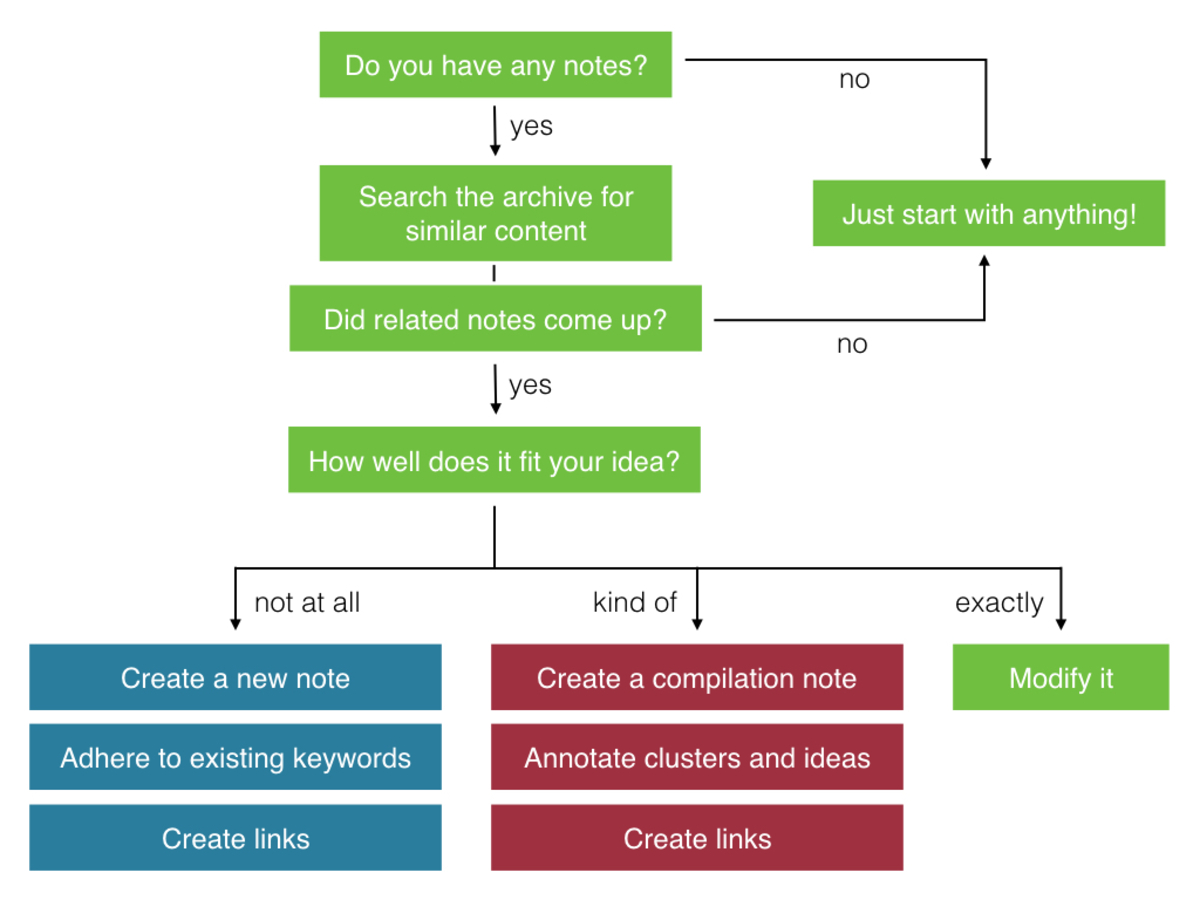zettelkasten notes
2020-09-04 06:22
main source: https://zettelkasten.de/posts/overview/
summary
A zettelkasten is a long-term investment in knowledge management. It is not a one-size-fits-all system, but a set of guiding principles designed to nurture the growth of a constantly evolving web of thoughts. With a little effort each day, a zettelkasten can swell over a lifetime to clearly illuminate connections between thousands ideas that might not otherwise been realized. Zettelkasten stands for “slip box” in German.
The core of the system is creating specific notes with specific tags. Tags are important because managing them forces you to encounter related ideas and update notes regularly. Tags are not categories– let categories come naturally when there is a need to group related notes into a meta-note.
Although pre-planning a zettelkasten generally runs counter to the dynamically changing nature, there are a handful of other best practices to consider at the outset. First, write notes that clearly convey the main idea. It is important to see this as a long-term investment, so notes written today should be able to be read in a decade. Second, defend against the collector’s fallacy– the tendency for humans to equate knowing something exists with knowing something. The purpose of a zettelkasten is to save cognitive snapshots, so it is pointless to merely copy and paste original sources without personal commentary on why it is important or interest.
rules of engagement
one and only one zettelkasten
Unless you are doing something specific where you might want to guard against irrelevant inputs. Like PhD research. In that case it might make sense to create a separate zettelkasten.
- https://zettelkasten.de/posts/your-first-note/
set links between notes
Find notes in the following order:
- direct links from note to note
- keywords or tags that join notes
- full-text searches
Relying on full-text search defeats the purpose of a zettelkasten.
writing terms change over time. you might miss something 10 years later
active participation in properly tagging notes creates more ideas
traversing the tag “trail” evokes old thought patterns, like a brain save-state
https://zettelkasten.de/posts/search-alone-is-not-enough/
understand how and when to create a new note
Don’t stress about the first note. lower the activation-energy for creating new notes
- https://zettelkasten.de/posts/your-first-note/
The main guiding principle for creating notes is the priciple of atomicity. Essentially, the goal is to craft notes generally so they can be re-used more easily. Like an abscract base class. Stuff the nucleous of a concept in an overview note, like “hard determinism”. Then you can inheret from that note in more specific follow-ups, like “moral responsibility under hard determinism”
- https://zettelkasten.de/posts/create-zettel-from-reading-notes/

Essentially, search for matching ideas already in the system.
no match - new note partial match - new compliation match using existing tags. Fix tags bidirectionally exact match - modify note
notes get too big only when you think they get too big. Essentially when it becomes more burdensome to find something in a giant document, you should break it up.
avoid cowardice when adding sources to notes
Putting an entire source in your zettelkasten if you don’t fully understand it is the collector’s fallacy.
The collector’s fallacy is our tendency to gather useful stuff and feel good about it. Knowing something exists is not the same thing as knowing something.
It’s the same thing as photocopying a reading without actually reading it.
“it’s your job to create information from a source”
Trust yourself to generate good ideas for each note so that, even if the source is no longer available, you still have something of value there.
understand how it might exist in a larger ecosystem of knowledge tools
- capture thoughts in a real notebook
- write these thoughts completely, so they can be fully understood later
- commit to using good tags